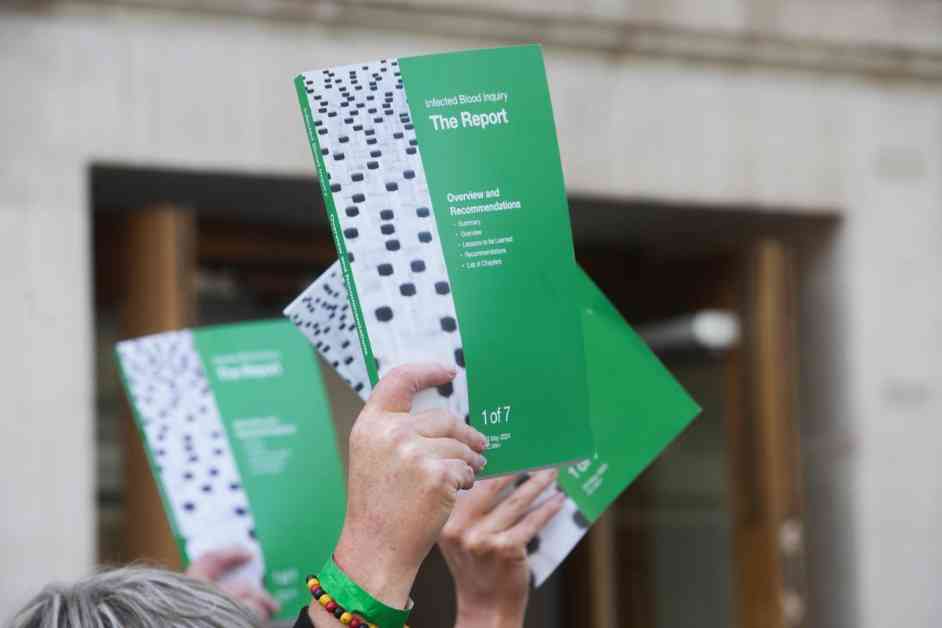The Infected Blood Inquiry report, released after much anticipation, has sparked outrage among victims of the Treloar’s scandal who feel that the compensation offered is inadequate. The report revealed shocking details of deliberate attempts to conceal the disaster, including the destruction of documents by Whitehall officials. Victims of the contaminated blood scandal, considered the worst treatment disaster in NHS history, are set to receive substantial compensation, but for former pupils infected at Lord Mayor’s Treloar’s College, the proposed payout of £15,000 has been met with criticism.
Outrage and Disappointment
Richard Warwick, a victim of the Treloar’s scandal who was infected with HIV and hepatitis B, expressed his disappointment with the proposed compensation amount. Describing it as a “kick in the teeth,” Warwick and other survivors of the trials are contemplating seeking legal advice on whether to challenge the decision. The figure of £15,000 offered to victims of the Treloar’s scandal is seen as insufficient and fails to reflect the gravity of the case. Warwick went on to state, “We all think it is derisory and insulting. It is unbelievable and unfathomable where they got this figure from. It’s a kick in the teeth.”
The victims of the Treloar’s scandal were unwittingly experimented on by clinicians at the specialist school, leading to infections with HIV and other viruses. The trials conducted on schoolboys with hemophilia were deemed unethical, and the victims have been left to deal with the lifelong consequences of their exposure to contaminated blood. Warwick’s sentiments are shared by many in the affected community, who feel that the compensation offered does not adequately address the harm and suffering they have endured.
Government Response and Compensation Scheme
Following the release of the Infected Blood Inquiry report, the government announced updates to the compensation scheme, promising support payments for life to the victims. The multibillion-pound plan aims to provide financial assistance to survivors and affected individuals, including family members of those who have died as a result of the disaster. The compensation scheme is set to start payments by the end of the year, offering some relief to the victims and their families.
While the government’s response to the Infected Blood Inquiry report has been cautiously welcomed by charities and campaigners, there are concerns about the scope of the measures. Some feel that the compensation offered falls short of addressing the full extent of the harm caused by the contaminated blood scandal. The decision to limit support payments to certain groups has raised questions about the inclusivity and fairness of the compensation scheme.
Call for Transparency and Accountability
Advocates for the victims of the contaminated blood scandal are calling for transparency and accountability in the compensation process. Rachel Halford, CEO of the Hepatitis C Trust, emphasized the importance of explaining the basis for the compensation figures to the infected blood community. She stated, “Thousands of lives were forever altered when people were given hepatitis C, and compensation must reflect that reality.” The demand for a clear and transparent explanation of the compensation calculations is crucial to ensuring that victims receive fair and just compensation for the harm they have suffered.
Jason Evans, founder of the Factor 8 infected blood campaign group, echoed the need for swift and fair compensation for those impacted by the scandal. He emphasized that the delays in providing compensation have resulted in the loss of many lives, underscoring the urgency of delivering financial support to the victims and their families. Evans called for the prompt implementation of the compensation scheme to ensure that those affected receive the assistance they desperately need.
Des Collins, senior partner of Collins Solicitors, who has represented over 1,000 victims and families affected by the contaminated blood scandal, highlighted the importance of informed and independent legal support for the victims. He expressed relief that the infected blood community would now have access to legal assistance as they navigate the compensation process. Collins emphasized the need for a clear timeline for applications and a commitment to providing support to all those affected by the scandal.
In conclusion, the victims of the Treloar’s scandal and the wider infected blood community continue to seek justice and fair compensation for the harm they have endured. The government’s response to the Infected Blood Inquiry report is a step in the right direction, but there are concerns about the adequacy and transparency of the compensation scheme. As the victims and their families await financial assistance, it is essential that their voices are heard, and their rights are upheld throughout the compensation process.












